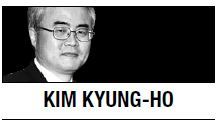A 13-year-old boy murdered his aunt, who was in her 50s, at their home in a provincial city early this month, angered by her admonishment that he spent too much time playing online games. She had taken care of him since both of his parents died years earlier.
What perplexed police officers who investigated the boy was that they could not arrest him because teenagers under age 14 are not subject to criminal punishment under the current law. This headline-grabbing incident  drew public attention to the worrying statistic that offenders who were too young for criminal punishment have committed about 10,000 crimes ― including felonies such as murder, rape, robbery and arson ― annually in recent years.
drew public attention to the worrying statistic that offenders who were too young for criminal punishment have committed about 10,000 crimes ― including felonies such as murder, rape, robbery and arson ― annually in recent years.
The boy’s case has rekindled debates over whether to lower the age of minors who are not punished for their crimes. A year ago, a bill calling for reducing the age to under 12 was submitted to parliament.
Some judiciary officials raise the need to put offenders in their early teens under custody to conduct a thorough investigation into their crimes and prevent them from repeating crimes. They argue that minors are more likely to repeat their crimes when they know that they will go unpunished.
But others note placing criminals in their early teens behind bars would only expose them to more opportunities to gain various criminal skills. In fact, many correction facilities in the country remain far from successful in serving as a deterrent against crime.
Comparison with other advanced countries may also give the weight to a more cautious stance. The age limit for being exempted from criminal punishment is set at 14 in Austria, Germany and Japan, with Italy and Sweden placing it at 15.
It is now important to extend the ongoing debates to address the whole picture of juvenile delinquency in our society.
The number of crimes committed by all minors under age 19 rose from 86,621 in 2011 to 90,694 last year. In particular, sex crimes increased by 22.3 percent over the three-year period to 2,303, according to figures from the National Police Agency.
What is more worrying is the increasing proportion of repeat offenders. Of all juvenile delinquents last year, 41.6 percent were repeat offenders, up from 36.9 percent in 2011. Not many Koreans may be aware that more than 10,000 minors have been convicted of crimes more than five times.
This gloomy phenomenon should alert Korean society, which is now tasked with helping youths grow to become citizens with competence and morality as its workforce is set to shrink over the coming decades due to a low birthrate and a fast-aging population. A study by a local research institute shows nearly 7 in 10 juvenile delinquents commit crimes after they become adults.
On the opposite end of this group of juveniles born into less privileged families are youths being forced by their more affluent and educated parents into fierce competition to achieve higher academic performance. If youths are the future of our society, as we often mention, our future seems far from secure and happy.
Sincere efforts should be made to work out solutions to aggravated juvenile delinquency, which could overshadow the country’s future unless tackled more actively and effectively. What we have seen so far are repeated calls for strengthened punishment or irresponsible indifference.
Certainly, juvenile delinquency is not a matter that can be handled just with compassionate methods. But there is a limit to toughening punishment when about 3,000 teenage offenders are put in jail and nearly 20,000 others on probation every year.
Lawmakers and government policymakers have not paid enough attention to preventing and reducing the number of juvenile crimes. Politicians’ indifference toward this matter contrasts sharply with their preoccupation with expanding free child care and school meal programs. They tend to leave a problem unaddressed when tackling it is unlikely to translate into more votes. The parents of juveniles have little influence over politicians, while millions of parents pay keen attention to welfare programs for their children.
But politicians should go beyond political calculations and take on the issue of juvenile crimes in a more active and sincere manner to make our society more secure and guide youths to prepare for a brighter future.
It will be more difficult, but focus should be put on preventing not punishing teenage crimes. Relevant government agencies, teachers and parents should also join hands to fight school violence, offer proper counseling and expand support for youths from low-income families.
Consideration needs to be given to the idea of delaying and eventually withdrawing indictment of juvenile offenders on condition that they receive education and training at alternative schools and other designated institutions. In this way, many youths could be saved from repeating crimes and encouraged to correct the course of their lives.
By Kim Kyung-ho
Kim Kyung-ho is an editorial writer for The Korea Herald. He can be reached at khkim@heraldcorp.com. ― Ed.



